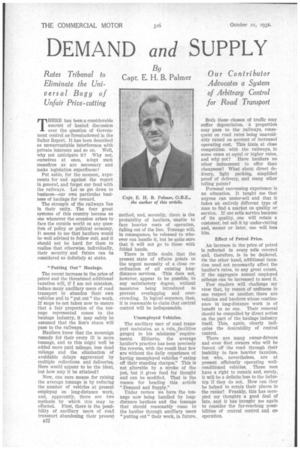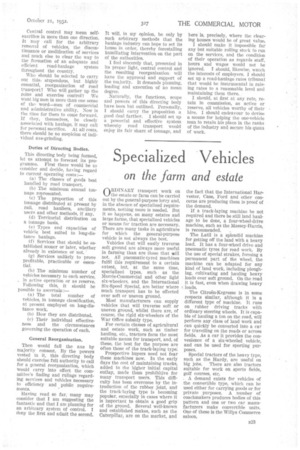DEMAND and SUPPLY
Page 48

Page 49

If you've noticed an error in this article please click here to report it so we can fix it.
By Capt. E. H. B. Palmer
THERE has been a considerable amount of heated discussion over the question of Government control as foreshadowed in the Salter Report. It has been described as unwarrantable interference with private interests and so on. Well, why not anticipate it? Why not, ourselves at once, adopt such meastlres as are necessary and make legislation superfluous?
Put aside, for the moment, arguments for and against the report in general, and forget our feud with the railways. Let us get down to business—our own particular business of haulage for reward.
The strength of the railways lies in their unity. The four great systems of this country become as one whenever the occasion arises to face the outside world on any question of policy or political economy. It seems to me that hauliers would be well advised to follow suit, and it should not be hard for them to realize that otherwise, individually, their security and future can be considered as definitely at stake.
"Putting Out" Haulage.
The recent increase In the price of petrol and the threatened additional taxation will, If I am not mistaken, induce many ancillary users of road transport to abandon their own vehicles and to "put out" the work. If steps be not taken now to ensure that a fair proportion of the tonnage represented comes to the haulage industry, it may safely be assumed that the lion's share will pass to the railways.
Hauliers know that the sovereign remedy fot their every ill is more tonnage, and to this might well be added more paid mileage, less dead mileage and the elimination of avoidable delays aggravated by multiple collections and deliveries. Here would appear to be the ideal, but how may it be attained?
Now, one sure means for raising the average tonnage is by reducing the number of vehicles at present employed on long-distance work, and, apparently, there are two methods by which this may be effected. First, there is the possibilit5, of ancillary users of road transport abandoning their present n22 method, and, secondly, there is the probability of hauliers, unable to face heavier costs of operation, falling out of the line. Tonnage will, in consequence, be released to whoever can handle it, but be quite sure that it will not go to those with folded hands.
There is little doubt that the present state of affairs points to the urgent necessity of a close coordination of all existing longdistance services. This does not, however, appear to be possible, to any satisfactory degree, without measures being introduced to prevent overlapping and overcrowding. In logical sequence, then, it is reasonable to claim that central control will be indispensable.
Unemployed Vehicles.
The ancillary user of road transport maintains, as a rule, facilities gauged to his minimum' requirements. Hitherto, the average haulier's practice has been precisely the reverse, with the result that few are without the daily experience of having unemployed vehicles "eating off their standing charges." This is not alterable by a stroke of the pen, but it gives food for thought and can be modified. That is the reason for heading this article "Demand and Supply."
Under review we have the tonnage now being handled by longdistance hauliers and the tonnage that should reasonably come to the haulier through ancillary users "putting out" their work, in future. Both these classes of traffic may suffer depreciation. A proportion may pass to the railways, consequent on road rates being unavoidably raised on account of increased operating cost. This hints at close -competition with the railways, in some cases at equal or higher rates, and why not? Have hauliers no other inducement to offer than cheapness? What about direct delivery, light packing, simplified proof of delivery, and many other telling points?
Personal canvassing experience is an education. It taught me that anyone can under-sell and that it takes an entirely different type of man to find a market on quality or service. If one sells service because of its quality, one will retain a customer, but sell it by under-cutting and, sooner or later, one will lose him.
Effect of Petrol Price.
An increase in the price of petrol is reflected in every mile covered and, therefore, is to be deplored. On the other hand, additional taxation need not necessarily affect the haulier's rates, to any great extent, if the aggregate annual employed mileage can be increased to meet it.
Few readers will challenge my view that, by reason of unfitness in one respect or another, there are vehicles and hauliers whose continuance in long-distance work is of benefit to no one. Their removal should be compelled by direct action on the part of the haulage industry itself. This, again, clearly indicates the desirability of central control.
There are many owner-drivers and even fleet owners who will be forced off the road through their Inability to face heavier taxation, but who, nevertheless, are at present efficiently operating wellconditioned vehicles. These men have a right to remain and, surely, It will be a definite loss to the industry. if they do not. How can they be helped to retain their places in the ranks? Frankly, this has occupied my thoughts a good deal of late, and it has brought me again to consider the far-reaching possibilities of central control and cooperation. Central control may mean selfsacrifice in more than one direction. It may call for the arbitrary removal of vehicles, the discontinuance or modification of services and much else to clear the way to the formation of an adequate and em dent road-haulage system throughout the country.
Who should be selected to carry out thisi stupendous, but highly essential, reorganization of road transport? Who will gather up the reins and exercise control? We want big men in more than one sense of the word—men of commereial and administrative ability. Now is the time for them to come forward. If they, themselves, be closely associated with haulage, it may call for personal sacrifice. At all costs, there should be no suspicion of individual axe-grinding.
Duties of Directing Bodies.
This directing body being formed, let us attempt to forecast its programme. First there would be to consider and decide, having regard to current operating costs :— (a) The classes of goods best handled by road transport.
(b) The minimum annual tonnage represented.
(c) The proportion of this tonnage distributed at present by rail, . road hauliers, ancillary users and other methods, if any.
(d) Territorial distribution on a tonnage basis.
(e) Types and capacities of vehicle best suited to long-distance haulage.
(f) Services that should be established sooner or later, whether already in existence or not. "
(g) Services unlikely to prove profitable, practicable or essential.
(h) The minimum number of vehicles necessary to each service, , in active operation or as reserve.
Following this, it should be possible to ascertain : (a) The total number of vehicles, in tonnage classification, at present employed on long-distance work.
(b) How they are distributed.
(c) Their individual effectiveness and the circumstances governing the operation of each.
General Reorganization.
Then would fall the axe by majority consent. By the powers vested in it, this directing body should exercise full authority to call for a general reorganization, which would carry into effect the committee's finding and rulings regarding services and vehicles necessary to efficiency and public requirements.
Having read so far, many may consider that I am suggesting the fantastic and that I am planning for an arbitrary system of control. deny the first and admit the second.
It will, in my opinion, be only by such arbitrary methods that the haulage industry can hope to set its house in order, thereby forestalling humiliating intervention on the part of the authorities.
I feel sincerely that, presented in its proper light, central control and the resulting reorganization will have the approval and support of the majority. It demands planning, leading and execution of no mean degree.
Naturally, the functions, scope and powers of this directing body have been but outlined. Personally, I should carry the proposition a good deal farther. I should set up a powerful and effective system whereby road transport would enjoy its fair share of tonnage, and here is, precisely, where the clearing houses would be of great value.
I should make it impossible for any but suitable rolling stock to run on the services, and the condition of their operation as regards staff, hours and wages would not be ignored. 1 should, likewise! watch the interests of employers. I should set up a road-haulage rates tribunal that would be instrumental in raising rates to a reasonable level and maintaining them there. .
I should, at first at any rate, retain in commission, as active or reserve, all vehicles worthy of their hire. I should endeavour to devise a means for helping the one-vehicle man to retain his place in the ranks of the industry and secure his quota of work.




































































































